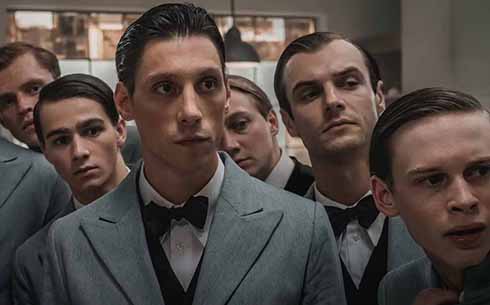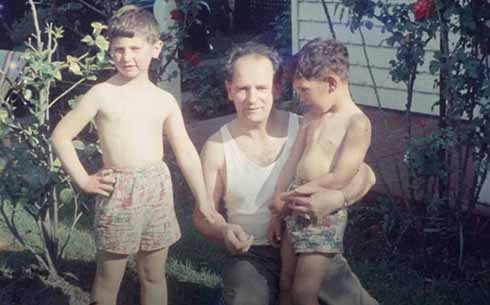STELLA. A LIFE, Germany, 2023. Starring Paula Beer, Jannis Niewohner, Katja Riemann, Damian Hardung, Lukas Miko, Nikolai Will, Ulrich Schmissat, Bekim Latifi. Directed by Kilian Riedhoff. 120 minutes.
Perhaps there should be a question mark after the word ‘Life’ in the title. Yes, this is something of a portrait of Stella, but the question of whether she really had a good life. There have been many films, of course, about life in Europe from 1939 to 1945, and a good many films showing life in Berlin at the time. An interesting comparison would be the Polish film, Filip. Both are about Jews surviving in Berlin.
Award-winner, Paula Beer (Frantz, Undine) plays Stella, something of a goodtime girl even during the difficult circumstances of 1940, singing with a group, a love of jazz, performing such songs as Let’s Misbehave, rather self-preoccupied, prone to admire herself lovingly in mirrors, bossy with the group, and rather unsympathetic to the young musician upset because his father has been imprisoned. Stella lives with her doting parents. The group do very well; perhaps, despite the persecution of the Jews, the world could be opening for Stella.
Transition to 1943. The world has not opened up. There is Stella, her mother, other friends, working in a German factory, wearing the Jewish star. Most of the film takes place in 1943, focusing on how Stella deals with the difficult situation, her ambitions, her desire for freedom, some concern for her husband, greater concern for her parents. With her blonde hair she does not look Jewish. Going out at night, she removes the star, flirts with the enemy, makes contacts with a Jewish underground, becoming more involved in the forging of passports, and sales.
She has to move from accommodation to accommodation, relying on friends’ support, and for her parents. At one stage, there is a raid in the factory, a sympathetic supervisor lets Stella escape with her parents but her husband is taken off to Auschwitz.
And this is where Stella’s life changes – for her better? Or her worse? Betrayed by a friend to the Gestapo, she is interrogated, treated brutally. However, Stella has been an opportunist and in trying to save her parents and herself, she betrays other Jews. So, whatever sympathy we had for Stella, diminishes – and audiences will be dismayed at her behaviour, her motivations. She callously betrays friends.
After a long close-up of Stella, 1943, the film suddenly transitions to 1957 to a trial (and there were initial indications that this story was based on trial proceedings). Stella is in court, with many of those she betrayed calling for her punishment, and a sympathetic visit from Aaron who shared the musical experience in 1940, he now in the US with an African-American wife and child, a test case of whether Stella can still elicit sympathy no matter what she has done.
It is really here that the film ends although there is a sequence in 1984, some information about 1994, leaving the audiences thinking about Stella. A Life – or Life?
 FILIP, Poland, 2022. Starring Eryk Kulm, Victor Mertelet, Caroline Hartig, Zoe Straub. Directed by Michael Kwiecinski. 125 minutes.
FILIP, Poland, 2022. Starring Eryk Kulm, Victor Mertelet, Caroline Hartig, Zoe Straub. Directed by Michael Kwiecinski. 125 minutes.
Filip is yet another World War II story, but a story with a difference. It is based on an autobiographical novel. This is a Polish film and it opens in 1941 in the Warsaw ghetto. The Jews herded together but surviving, dramatised by the music hall sequence, enthusiastic singing, and excited audience, with a sudden invasion, shooting, many dead, including the fiancee of the central character. The audience is left with this atrocity and emotional response.
There is an immediate transition to Frankfurt in 1944. Filip is now a waiter in the Park Hotel, along with a number of other foreigners who have been accepted as workers in Germany. They have a Polish liaison who is able to get the documentation and keep them in work – though, it is shown that there is great pressure on him and he eventually takes his life.
While there is talk of war, especially the women whose fathers, husbands and sons are away on the front, life seems to be ordinary in Frankfurt. The hotel is functioning even if there is some rationing. The audience sees the life of hotel, the work of the waiters, the rather poor accommodation, the friendships they have developed. But, there is something different with many of the waiters – sexual liaisons with the German women, and some men.
Filip seems to have changed since his Warsaw days, keeping fit with continued exercise, doing his job, making friends, but, the audience soon realises, Filip takes advantage of his situation to wreak some revenge on the Germans, especially in seducing and humiliating women. Filip makes a bet that he can seduce a young woman and turn her into a prostitute.
However, all is not easy, some of the waiters are found out, humiliated, shot. And, by contrast, Filip is attracted to the young woman he intends to humiliate. They meet, converse and fall in love. They plan to leave for Paris – but the situation is changed because of aerial bombardments of Frankfurt.
The film turns grim. There are preparations for a lavish wedding at the hotel, the return of a Polish woman to the hotel with whom Filip had a relationship, her hair being cut because of her relationship with the Germans. And, his close friend, Pierre, is also humiliated. Filip breaks down at the death of Pierre, telling everyone that he is Jewish and Polish, the officials choosing not to believe him but that he is overcome with grief. There is a most powerful sequence with Filip groaning his grief. There is an encounter with the girl he loves and the final scenes of him taking the train for Paris. A grim reminder of the reality of war – but even more of the effect of war and brutality on individuals.
 REVENGE: OUR DAD THE NAZI KILLER. Australia, 2023, 101 minutes, Colour. Directed by Danny Ben-Moshe.
REVENGE: OUR DAD THE NAZI KILLER. Australia, 2023, 101 minutes, Colour. Directed by Danny Ben-Moshe.
One of several Australian documentaries where later generations of Australian citizens investigate their Jewish ancestors. From the same year came I’ll be Frank and Jewish Nazi. Three sons of a distinguished Jewish businessman are alerted to the information that their father, a partisan, who migrated from Europe after the end of the war to Australia, belonged to a group of refugees, and networks, vowing to wreak vengeance on those who had persecuted the Jews during World War II, hunting them down and executing them.
The older son is a rabbi. The second son is a musician and supplied music for the film. The youngest son began to investigate his father with the help of his older brother, drawing on the assistance of private investigators, they uncover complicated interactions involving their father, covert vigilantes, the disappearances of alleged Nazis, and all undercover.
The drama of the film is, firstly, the sons’ awareness of their father and his history in Europe, especially the persecutions and murders. There are some striking visuals of these hellish massacre diggings.
The brothers make a number of contacts, hold interviews, and eventually travel to Europe for further interviews about the situation – and in the meantime, there is video material of their father and his popular reputation.
There are always stories about World War II, the persecution of the Jews, not only in the concentration camps, but in local massacres, always horrifying – and with repercussions on the later generations.
 I’LL BE FRANK. Australia, 2023, 54 minutes, Colour. Voice: John Gaden. Directed by Aaron Frank.
I’LL BE FRANK. Australia, 2023, 54 minutes, Colour. Voice: John Gaden. Directed by Aaron Frank.
A personal investigation of ancestry by Australian Aaron Frank, who directs, edits and features in the film. The Frank of the title is his grandfather who migrated from Germany in 1939, settling in Australia and having a fruitful life as the doctor. There are some clips of him at various functions inserted throughout this documentary. However, his grandson, Aaron, has gone to Germany, wanting to find out more about his grandfather, about the situation of Jews in Germany, noting that many Germans who were deprived of their German citizenship between 1939 and 1945 were offered it again. Which means that he also has a German passport – and was questioned on arrival in Germany by the passport officer, asking about his German passport and his speaking German or not.
Aaron is personable on screen, and is a personal and emotional movie. In the opening of the film, he is going back to the address of his grandfather. With the original house bombed, there is a very modern and comfortable reconstruction adjacent to a park. He also visits the village where his grandfather had originated.
He has a manuscript written by his grandfather and reads from it, quotes from it, photos, statistics, information about his grandfather’s father and mother, his uncle who went to Holland, married, but was arrested with wife and son and killed in the concentration camps. He built up quite a picture of life in the 1920s and 1930s as well as moving around Berlin and trying to appreciate what happened during the Nazi era. He receives a phone call from a friend of the family in Holland, who gives him the information about the family’s death. He weeps.
He invites audiences to empathise with him, his pride in his Judaism and his heritage, his search to understand his ancestry, his admiration for his grandfather.
During the final credits there are interviews with Australians with German ancestry, some happy to explore it, others treating their German citizenship with antipathy. And, for movie buffs, there is an interesting documentary on mogul, Jack L Warner (and the rise and success of Warner Bros).
JIFF 2023 VENUES
Melbourne
Classic Cinemas, Elsternwick | 23 Oct-29 Nov
Lido Cinemas, Hawthorn | 24 Oct-28 Nov
Sydney
Ritz Cinemas, Randwick | 24 Oct-28 Nov
Roseville Cinemas | 2-19 Nov
Canberra
Dendy Cinemas, Canberra | 15-22 Nov
Hobart
State Cinema | 2-12 Nov
Brisbane
New Farm Cinemas | 16-26 Nov
Gold Coast
Dendy Cinemas, Southport | 16-22 Nov
Perth
Luna Palace, Leederville | 16 Nov-6 Dec